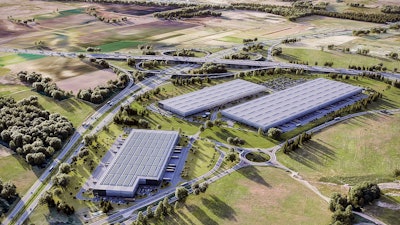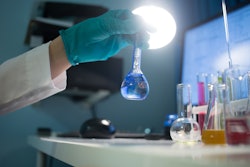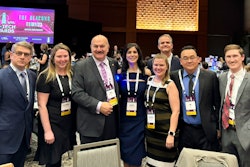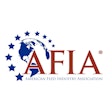
Hungarian insect producer Agroloop has chosen Bühler’s sophisticated insect growth system for its industrial black soldier fly plant. The facility will produce up to 4,000 metric tons of animal feed ingredients per year and will be built in Üllő, Hungary.
Swiss technology group Bühler will deliver its proven crate-based nursery and rearing technology, which will enable a quick ramp-up of the plant for commercial production. By the end of 2024, Agroloop plans to launch its first products, contributing to a more sustainable animal feed value chain.
After its foundation in 2017 and the successful operation of a pilot facility, Agroloop got the green light for the implementation of an industrial insect plant in Hungary in 2022. Now it has selected all execution partners and is working at full speed to construct the plant and get it operational. The insect facility will be realized in an existing building of the Aerozone Park in Üllő, which is located next to the Budapest Ferenc Liszt International Airport. In the new plant Agroloop – supported by Bühler insect technology expertise – will produce more than 25,000 metric tons of black soldier fly larvae that will be turned into sustainable feed ingredients for the pet food, aquaculture and livestock sectors.
The plant is only the first step in Agroloop’s strategy to make insect feed ingredients available for the Central and Eastern European (CEE) agribusiness.
“The abundance of food processing byproducts presents a unique opportunity for Agroloop's multi-plant rollout strategy in the CEE region. Leveraging our strategic partnership with the leading regional feed producer UBM Group, we improve feed quality and sustainability creating future-proof feed formulas. This enables Agroloop to focus on rapid expansion and solidifies our position as a key player in the region,” said István Nagy, co-founder and CEO of Agroloop.
Proven technology for short ramp-up time
Agroloop employs a local engineering company to integrate the various technology packages. The heart of this system is the insect growth technology, which mainly determines the plant yield and has a major effect on business performance. For their insect growth system, Agroloop has selected Bühler’s nursery and rearing technology, which has several years of a track record in the insect industry.
“We’ve meticulously assembled a best-in-class technology supplier portfolio to build our plant. Bühler plays a crucial role in providing the framework and core components for this design. By choosing Bühler’s technology, Agroloop can enter the value chain with the highest standards,” Nagy said.
“We are very proud to be part of this pioneering project for the CEE region and delighted to see that our solutions will contribute to more sustainable feed supply chains,” said Andreas Baumann, head of market segment insect technology at Bühler.
Sustainable protein
In the pursuit of sustainable and environmentally friendly practices, the CEE region is increasingly turning to alternative sources for feed ingredients. By incorporating insects into the feed supply chain, the region can address environmental concerns, reduce dependence on imported protein sources and contribute to a circular economy approach. In addition, innovative feed formulations containing insects can optimize animal health and growth, thus leading to more efficient livestock production systems.
Insects can be reared on agricultural and food processing byproducts, transforming these materials into high-quality protein. This approach not only reduces the environmental impact of this value chain but also creates a closed-loop system where resources are reused and recycled. The European Union has historically been dependent on imported protein sources for animal feed, contributing to issues such as deforestation and habitat destruction in other parts of the world. By embracing the commercialization of insect-based livestock feed, the region can increase feed efficiency, reduce reliance on external sources, and contribute to local and regional food security.
“The incorporation of insect ingredients in animal feed presents a compelling solution to the challenges faced by the livestock industry,” Baumann said. “Besides providing nutritious and sustainable protein source, insects also empower local economies to become self-sufficient. That is why insect protein is seen as a key component for a more sustainable and resilient food system.”










